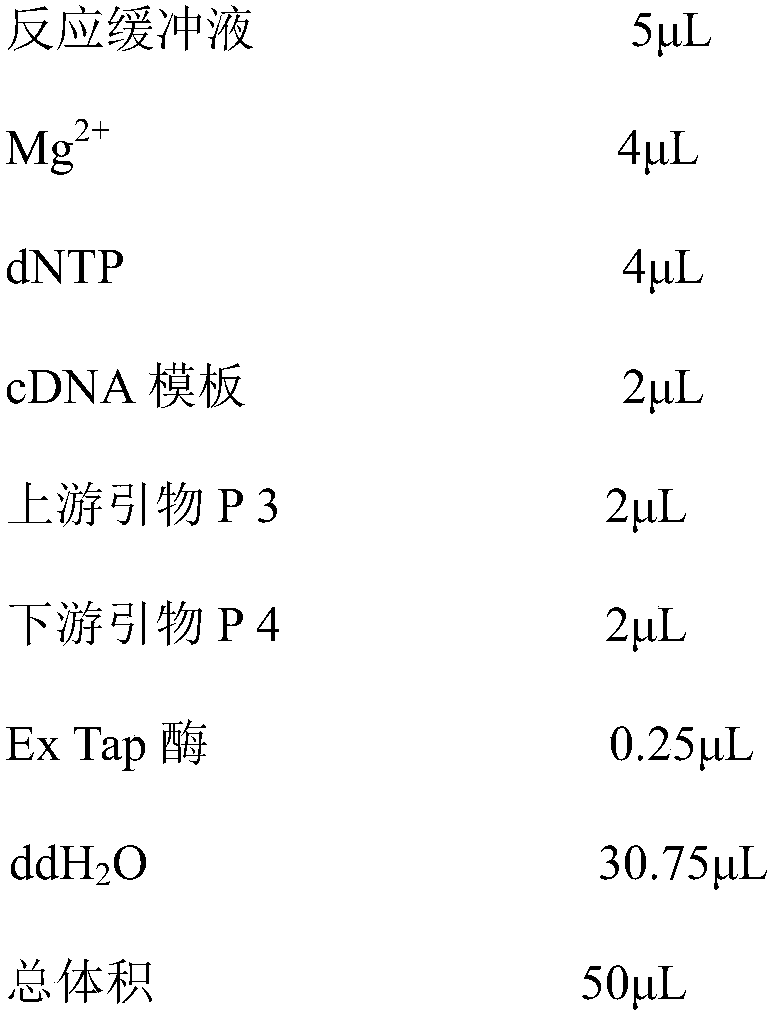Planthopper lethal gene segment
A technology of gene fragments and planthoppers, applied in the field of agricultural biology, can solve the problems of poor chemical control effect and environmental pollution, achieve significant lethal effect, low synthesis cost, and facilitate large-scale application
- Summary
- Abstract
- Description
- Claims
- Application Information
AI Technical Summary
Problems solved by technology
Method used
Image
Examples
Embodiment 1
[0036] 1. Cloning method of ubiquitin-conjugating enzyme morgue gene fragment:
[0037] (1) Get 10-20 heads of SBPH, and use the TRIzol method to extract total RNA;
[0038] (2) Synthesizing the first strand of cDNA;
[0039] (3) Obtain the gene fragment sequence from the SBPH transcriptome, in http: / / www.ncbi.nlm.nih.gov / After the homology comparison, it was predicted to be the ubiquitin-conjugating enzyme morgue gene of SBPH, and P 1 and P 2 were designed using Primer premier 5.0 software, and amplified by RT-PCR;
[0040] Upstream primer (P1): 5'ATTGGATCTCAACCGCC 3' (SEQ ID NO.2),
[0041] Downstream primer (P 2): 5'GCATATTTCCACGTCCA 3' (SEQ ID NO.3);
[0042] PCR conditions are: denaturation at 94°C for 2min, 30sec at 94°C, 30sec at 55°C, 30sec at 72°C, 35 cycles, extension at 72°C
[0043] PCR reaction system (50μL):
[0044]
[0045] (4) The PCR product is separated by agarose gel electrophoresis, and the target DNA fragment is recovered;
[0046] (5) Insert the ...
Embodiment 2
[0050] Embodiment 2.dsRNA synthesis and recovery
[0051] (1) According to the sequence of the verified ubiquitin-conjugating enzyme morgue gene fragment, P 3 and P 4 were designed using Primer Premier 5.0 software;
[0052] Upstream primer (P3): 5'TAATACGACTCACTATAGGGATTGGCAAGCAACTATAA 3'(SEQ ID NO.5)
[0053] Downstream primer (P4): 5'TAATACGACTCACTATAGGGAGCTCTGGCGATGTCTTC 3'(SEQ ID NO.6)
[0054]
[0055] PCR conditions: Denaturation at 94°C for 2min, 30sec at 94°C, 30sec at 60°C, 30sec at 72°C, 38 cycles, extension at 72°C.
[0056] (2) The PCR product was separated by electrophoresis on a 1% low-melting point agarose gel and observed under ultraviolet light. The sequence is shown in SEQ ID NO.4.
[0057] (3) Using Promega's SV Gel and PCR Clean-Up System kit for recovery:
[0058] ① Cut the gel of the separated target fragment, put it into a 1.5ml microcentrifuge tube that has been weighed in (a), weigh (b) again, and calculate the weight of the cut gel in b-a;
...
Embodiment 3
[0068] Example 3 Planthopper feeding dsRNA experiment
[0069] (1) Seal one end of the glass tube with a parafilm, absorb second-instar planthoppers (BPH, BPH) into different glass tubes with an insect sucker, and seal the other end with gauze;
[0070] (2) Gently pat the insects to one end with your hands, remove the gauze from the other end, and put the prepared parafilm sticker face up, pull evenly to both sides, pull it into a square, and then cover it on the glass On the nozzle of the tube, place the tube upright on the ultra-clean table;
[0071] (3) Use a pipette to draw 100 μl of feed and drop it in the center of the parafilm. The control only adds feed (see Table 2 for formula), and the treatment group adds dsRNA of ubiquitin-conjugating enzyme morgue gene in the feed, and the dsRNA concentration is 2300ng / μl. Use a new parafilm, with the sticker side facing down, on the opening of the glass tube, and seal the feed and dsRNA between the two layers of parafilm;
[00...
PUM
 Login to View More
Login to View More Abstract
Description
Claims
Application Information
 Login to View More
Login to View More - R&D Engineer
- R&D Manager
- IP Professional
- Industry Leading Data Capabilities
- Powerful AI technology
- Patent DNA Extraction
Browse by: Latest US Patents, China's latest patents, Technical Efficacy Thesaurus, Application Domain, Technology Topic, Popular Technical Reports.
© 2024 PatSnap. All rights reserved.Legal|Privacy policy|Modern Slavery Act Transparency Statement|Sitemap|About US| Contact US: help@patsnap.com










